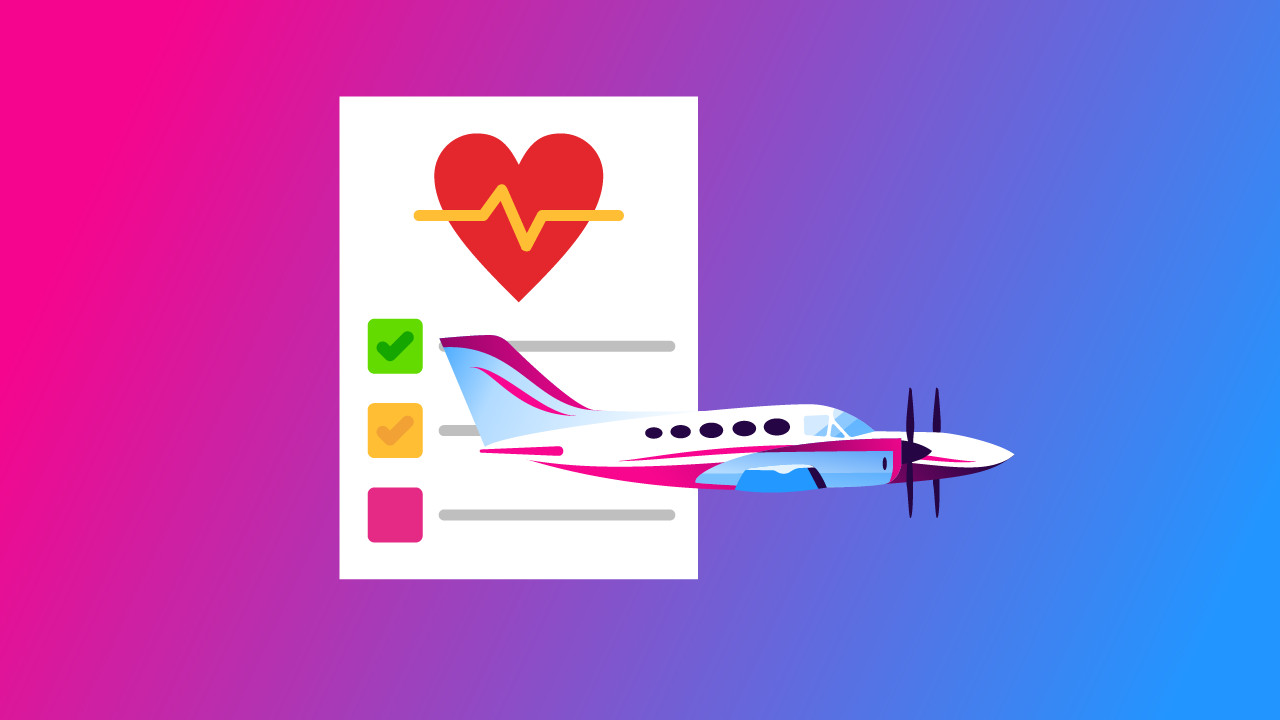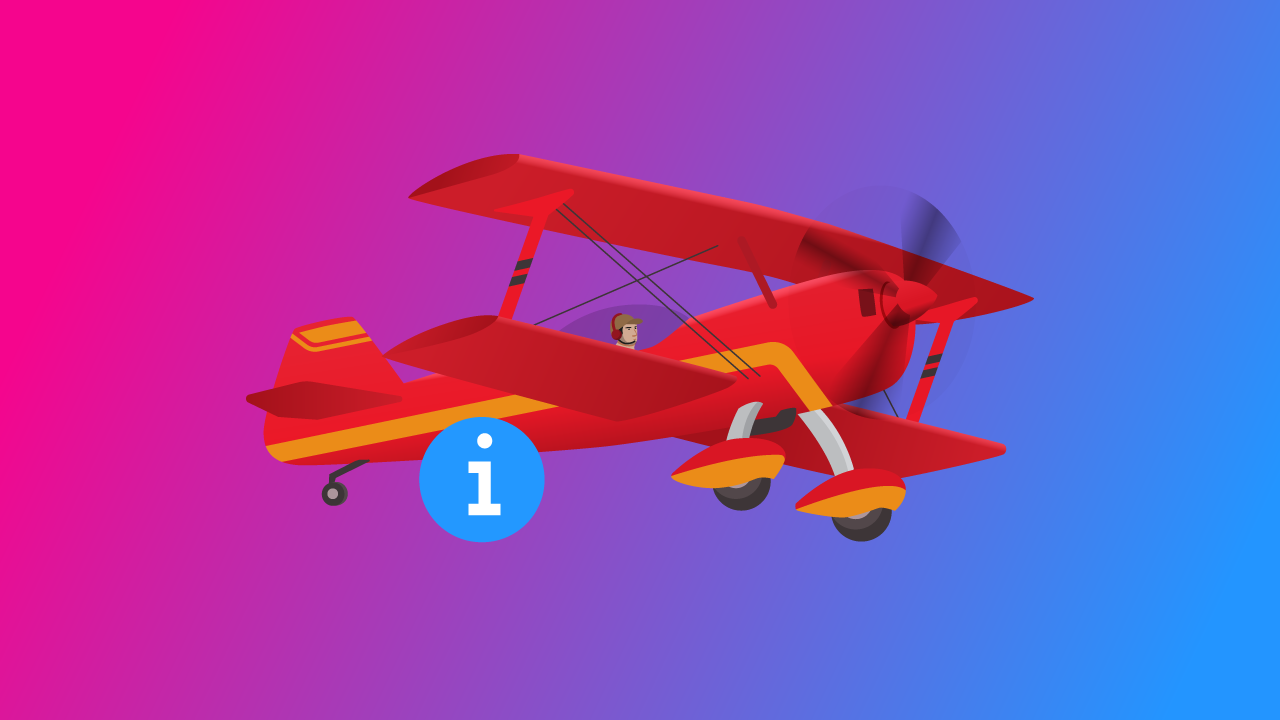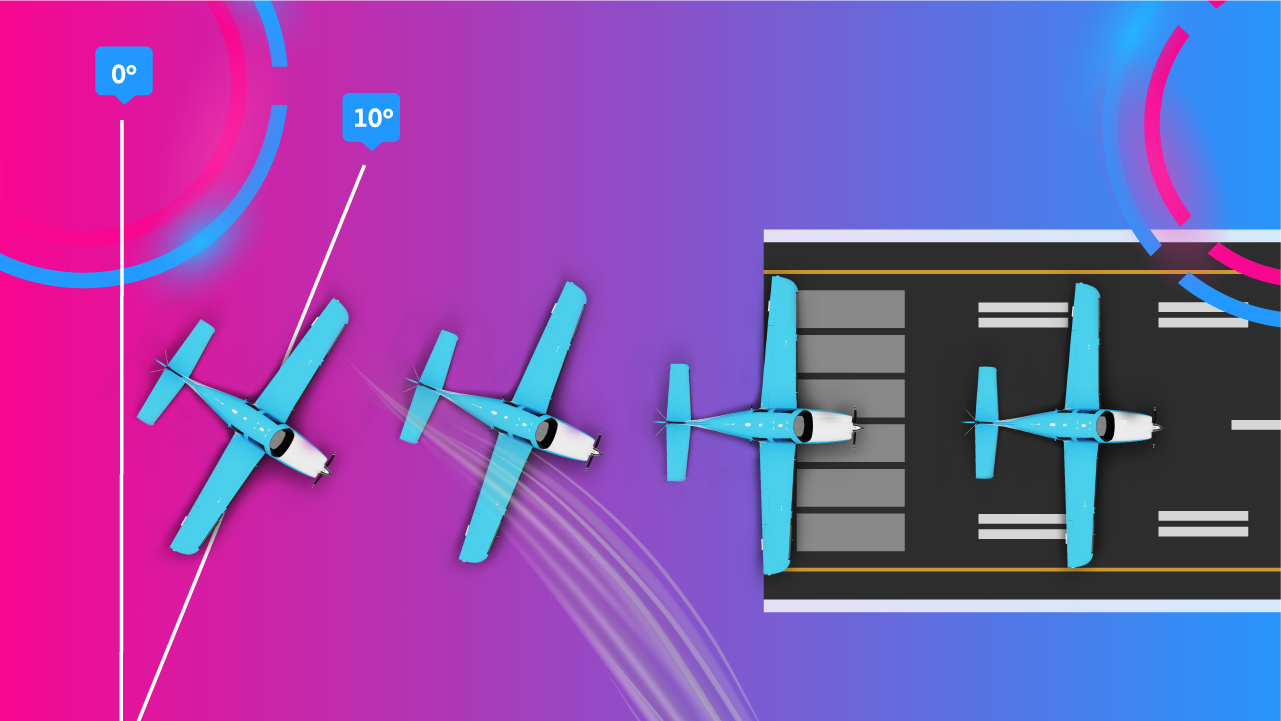-
Key Takeaways
-
Best Habits for Pilot Health
- Hydration & Sleep
- Exercise
- What’s on Your Plate?
-
Mental Health and Stress Management for Pilots
- Relaxation Techniques
- Support Networks
-
FAA Health and Fitness Requirements
- Medical Certificate Classes
- Health Requirements
-
Common Health Challenges Faced by Pilots
- Fatigue
- Long Flights and Jet Lag
- Additional Health Concerns
-
Practical Tips for Staying Fit to Fly
- Training for Performance
- Recovery Tips
-
Conclusion
As a private pilot, your health affects how you perform in the cockpit. Your physical and mental well-being helps you to pass the FAA’s medical checks, and they’re what keep you alert and ready in the air.
It’s easy to get caught up in maintaining aircraft readiness, but what about your body?
Staying fit to fly means focusing on everything from how you manage your stress to what you eat before a flight.
You might think the occasional gym visit or a balanced meal here and there cuts it, but being flight-ready demands more than a quick fix. The lifestyle habits you pick up can shape your reflexes, decision-making, and energy levels.
This guide will walk you through practical tips and insider insights to help you stay in top shape. You matter just as much as the airplane you’re piloting.
Key Takeaways
- Focus on sleep, diet, and exercise to stay flight-ready.
- Physical and mental health are equally important for pilots.
- You’ll take many medical exams, so staying in shape is key to keep flying.
- Fatigue, jet lag, and long flights are tiring, but good habits are your best defense.
Best Habits for Pilot Health
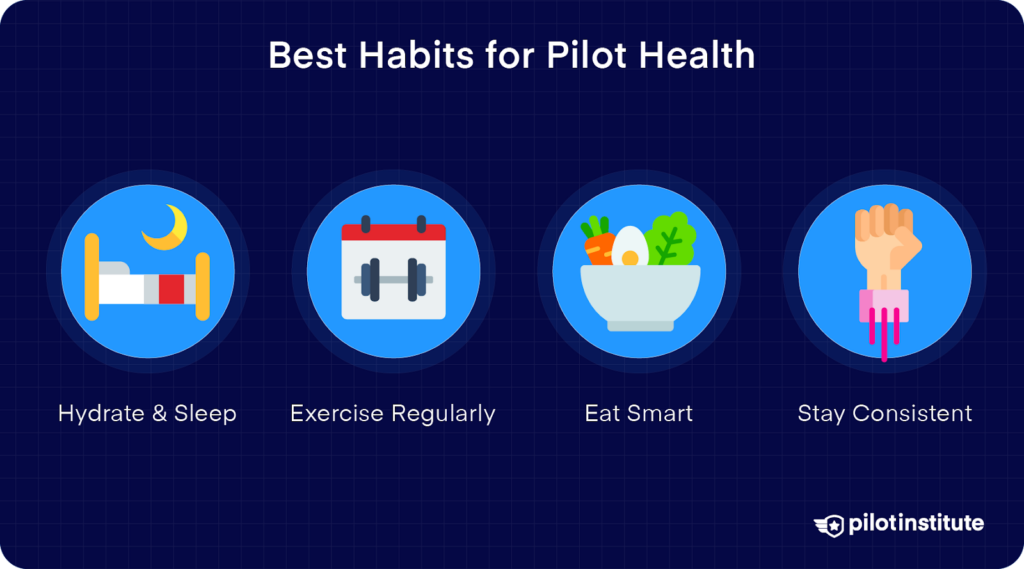
Do you want to achieve peak performance as a pilot? If so, then you’ll have to build up your physical health.
The good news is you can improve your health with just a few simple habits! You’ve probably heard of some of these, but it’s simply because they’re known to work.
Hydration & Sleep
Let’s break down how to keep yourself fit, focused, and ready to fly:
- Hydrate regularly. Staying hydrated will reduce fatigue, headaches, and dehydration, which can become problematic during long flights. Keep a water bottle handy and sip throughout the day.
- Prioritize sleep. We understand that a pilot’s schedule can be unpredictable. Nevertheless, you should still aim for 7-8 hours per night, and stick to a regular schedule as much as you can. If that’s a challenge for you, squeeze in a couple of power naps to boost your energy and focus.
Exercise
Do you fly long hours in confined spaces? Do you feel worn out after a steep turn or rough landing? If so, focusing on strength, endurance, and flexibility will be a game-changer.
Try adding these exercises to your routine:
- Strength training: Do bodyweight exercises like push-ups and squats, or work out with resistance bands and weights. These exercises will improve your posture and reduce neck and back strain during long flights or tough maneuvers. Core exercises are also great for maintaining balance and comfort.
- Endurance activities: Aim for 20-30 minutes of cardio, like running, cycling, or swimming, a few times a week. Cardio increases stamina, helping you stay sharp on long flights.
- Flexibility routines: Try stretching or yoga to keep muscles limber. Focus on areas that get stiff from sitting, such as your shoulders, neck, and lower back. Even a few minutes of stretching daily will improve your mobility and reduce muscle tension.
What’s on Your Plate?
These habits are just one part of the equation. To reap the full benefits of being physically fit, you’ll have to upgrade your diet as well.
Does eating healthy have to be complicated? Absolutely not. You always have a choice to skip junk food and fill your plate with the good stuff.
Here are your options:
- First, eat whole foods and stick to them whenever possible. These provide steady energy and prevent blood sugar crashes. Some great examples are lean proteins like chicken and fish, complex carbs, and a variety of fruits and vegetables.
- Avoid heavy meals right before flying. Instead, opt for lighter choices like salads with lean protein or a fruit smoothie. High-protein, nutrient-rich options are easy to digest, so you won’t feel sluggish.
- You might not want to hear this, but you should also cut back on your caffeine. Yes, it can give you a boost, but having too much leads to crashes and dehydration. What should be your main sources of energy? Remember, they are water, balanced meals, and rest.
Consistency is the foundation of good health. For this, all you need are discipline and time management.
In time, you’ll have built enough momentum that these habits become second nature. You’ll see your efforts pay off, with a body and mind equipped to handle the job.
Mental Health and Stress Management for Pilots
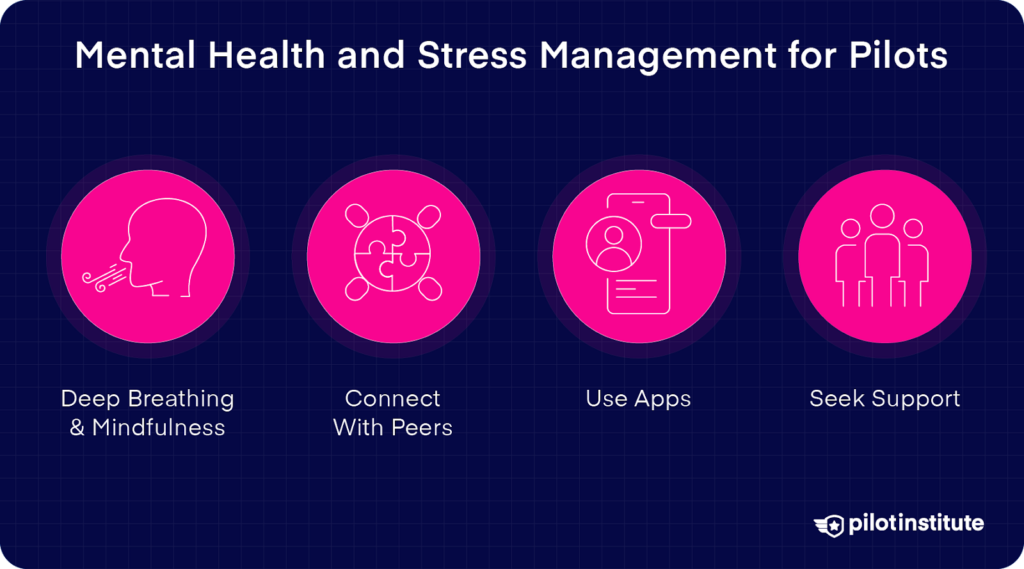
Overall health doesn’t just mean taking care of your body, but taking care of your mind as well.
Do stress and anxiety weigh you down on the job? Or perhaps, you’re just trying to look after your mental health?
Relaxation Techniques
When stress levels rise, these techniques can bring you back to center. Try them before, during, or after flights:
- Deep breathing exercises: Take a slow, deep breath, hold for a moment, and exhale gradually. Repeat several times, and you’ll lower your heart rate and feel an instant sense of calm, especially in high-pressure moments.
- Visualization: Picture yourself easily handling challenging situations, like navigating turbulent weather or working through complex procedures. Visualizing success builds confidence and prepares your mind to stay calm under stress.
- Physical relaxation: Do simple stretches or neck rolls every once in a while, especially during long waits or on breaks. Loosen any tight grip on the controls or pen to ease physical tension.
- Mindfulness breaks: Take brief moments to tune in to your surroundings. Notice sounds, textures, or small details around you. If you start to get tunnel vision, expand your focus and look at everything in front of you as a whole.
Support Networks
Mental struggles can be tough, especially with a job like ours. But remember, you do not have to go through this alone.
The people around you can be your best comfort if you’re feeling overwhelmed. Here are a few helpful resources:
- Employee Assistance Programs (EAPs): Many airlines and aviation organizations offer EAPs, which provide counseling services, stress management resources, and other mental health support.
- Peer support networks: Reach out to other pilots who understand the demands of the job. These connections create a safe space to discuss your experiences. You can share coping strategies and offer encouragement to other pilots openly and without judgment.
- Mental health apps: Apps like Headspace or Calm can provide quick access to guided meditation and relaxation techniques. Plus, they’re easy tools to incorporate into your busy schedule.
- Professional counseling: Therapists trained in stress management or specialized in high-pressure jobs can help you develop a tailored plan for mental well-being. You’ll receive advice from experts on how you can manage your stress.
FAA Health and Fitness Requirements
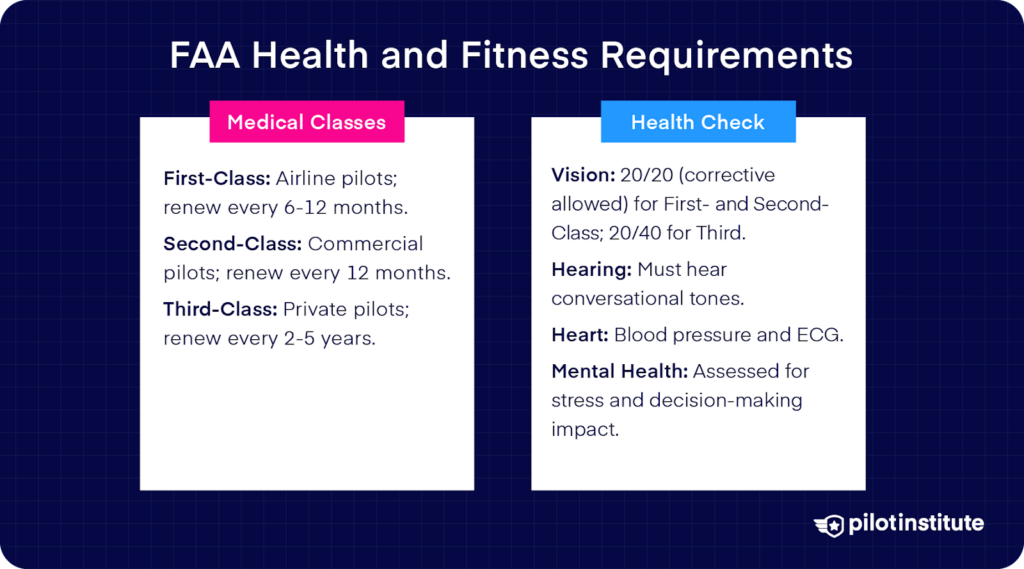
When we say that your career depends on your health, we mean it. Without qualifying for an FAA medical certificate, you won’t be able to obtain a license, let alone fly.
But if you stay physically and mentally fit, you’ll have nothing to worry about!
Medical Certificate Classes
The FAA requires different medical certificates depending on the kind of flying you do. There are three main classes:
- First-Class: For airline transport pilots. This certificate has the strictest health standards. If you’re under 40, you’ll need to renew every 12 months; if you’re 40 or older, renew every six months.
- Second-Class: For commercial pilots. This certificate requires a medical exam every 12 months, regardless of age.
- Third-Class: For private or recreational pilots. If you’re under 40, you’ll have to renew every 5 years. If 40 or older, renew every 2 years.
Each class has different medical standards. Of course, as you go up in your career, you should expect stricter fitness measures.
Health Requirements
So, which parts of your health will get checked? You should take extra good care of these areas:
- Vision: First- and Second-Class pilots need 20/20 vision in each eye (corrective lenses are okay). For Third-Class, you need at least 20/40 vision in each eye.
- Hearing: You need to hear conversational tones without a hearing aid.
- Heart health: The FAA checks your blood pressure and heart health to ensure your body can handle the stresses of flying. They’ll look at your ECG and blood pressure and may ask for more tests if any issues arise.
- Mental well-being: The examiner will assess if you’re experiencing high stress, anxiety, or other mental health issues that could impact decision-making in the cockpit.
You’re responsible for maintaining your fitness between exams. If a new health problem arises, you’ll need to report it to the FAA, who will decide if it affects your ability to fly safely.
If you have certain medical conditions, like high blood pressure or diabetes, you’ll need a Special Issuance Medical Certificate. This involves extra paperwork and sometimes additional health monitoring.
Another thing to take note: the FAA strictly prohibits flying with alcohol or drugs in your system.
You might have heard of “8 hours from bottle to throttle,” meaning you must abstain from alcohol at least eight hours before your flight.
Regular screenings check for traces of these substances in your body, and a breath alcohol concentration of 4% or above will get you in serious trouble.
Common Health Challenges Faced by Pilots
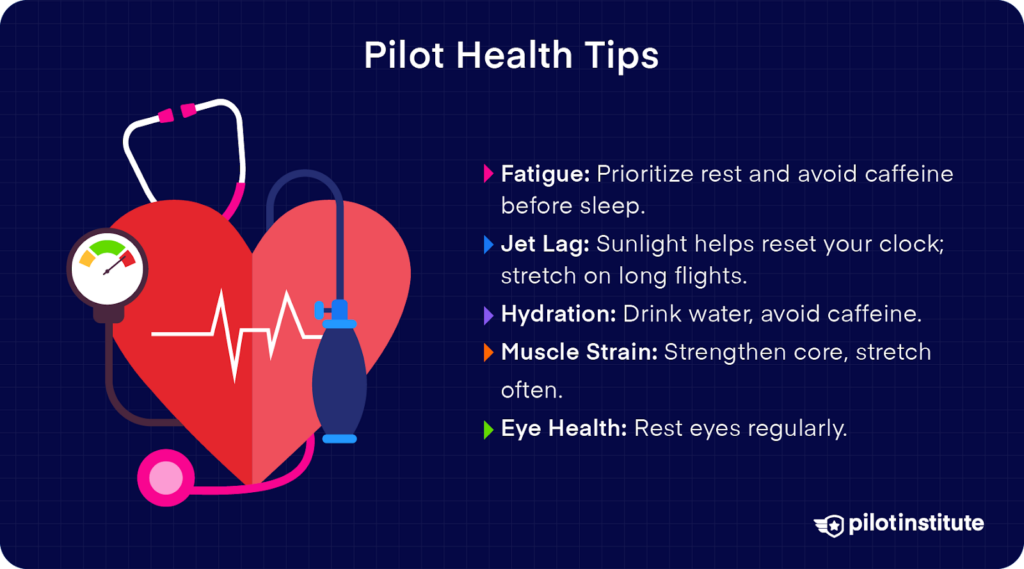
From long hours and jet lag to issues like dehydration and eye strain, pilots face unique health challenges from the nature of their job.
Fatigue
Are you always feeling exhausted? Do you catch yourself having trouble concentrating or experiencing slower reaction times? Maybe you’ve become more irritable or forgetful, and your thoughts feel “foggy.”
None of these are safe in a cockpit, and they all stem from one thing: fatigue.
Fatigue is the physical and mental toll that flying takes on your body. Having to make critical decisions and being exposed to changing load factors will wear out anyone.
Your best weapon against fatigue is–simply–rest. Establish a consistent bedtime routine, even if hours are irregular. And as we’ve said, avoid caffeine and heavy meals before sleep.
If you’re feeling weighed down, know that it’s absolutely okay to take a break. You should never force yourself to perform if your body is telling you otherwise. Fatigue is a serious safety hazard, so sometimes, the wisest choice is just to stay in and recover.
Long Flights and Jet Lag
Jet lag is a huge pain that comes with the job. When you’re constantly switching between different time zones on long flights, your body clock suffers the consequences.
This happens when your internal clock is out of sync with the local time. You might experience symptoms like daytime drowsiness, irritability, and difficulty sleeping.
Your best weapon against jet lag? Sunlight. Once you arrive, expose yourself to natural light to help reset your internal clock. Go on walks or keep your windows open when you’re indoors during the daytime.
Before departure, gradually adjust your schedule to match your destination time zone.
Another consequence of long flights is physical discomfort. And when your back or legs are sore, it’s definitely harder to stay alert and focused.
You can beat this by stretching before, during, and after flights. Take small breaks to stand, stretch, or walk around whenever possible.
This movement boosts circulation which will help you feel fresher after a long flight.
Additional Health Concerns
The environment inside the cockpit and the physical demands of the job can cause some other health issues for you. Here are just some examples you should watch out for:
- Dehydration: Cockpit air is often very dry, which can lead to dehydration. Keep a water bottle within reach and take sips throughout your shift to stay hydrated. Coffee, tea, or sodas actually dehydrate you even further, so try to stay away from them.
- Musculoskeletal strain: Pilots often experience neck, back, and shoulder strain from sitting and handling controls. Strengthening exercises for your core and back outside of work will help support better posture and reduce strain.
- Eye health: Staring at instrument panels for long periods can lead to eye fatigue. Take regular breaks to look away from screens or panels and focus on something at a distance.
Practical Tips for Staying Fit to Fly
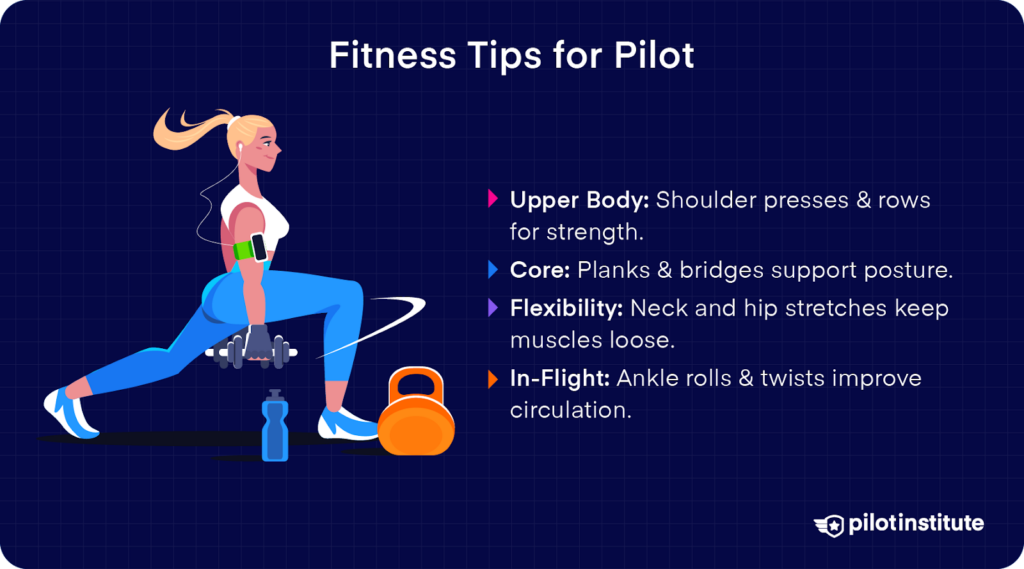
The physical strength involved in flying an aircraft is no joke. During tough maneuvers, controlling the yoke takes serious upper body strength, and coordinating with the rudders involves lower body strength.
Training for Performance
How can you help your body keep up? We’ve got some targeted exercises that will boost your performance in the cockpit.
For strong shoulders and arms, use resistance bands or light weights. Try shoulder presses, rows, and shoulder rotations.
Focus on planks, bird-dogs, and bridges to strengthen your core. These exercises will also reduce pressure on your lower back and help you maintain good posture.
See if you like doing neck rotations, shoulder shrugs, seated spinal twists, and hip openers. These will keep your muscles loose and ready for the long, confined hours ahead.
Even in the cockpit, you can do small movements to improve circulation and reduce stiffness. Ankle rolls, wrist circles, shoulder shrugs, and seated twists can keep you feeling comfortable during extended flights.
Recovery Tips
Even with your best efforts, though, there will still be days when the stress takes a toll on your body. When you’re feeling a bit off, try these quick recovery techniques:
- Rehydrate with electrolytes: After a tiring flight, drink water with added electrolytes or a rehydration beverage. Coconut water, natural fruit juices, and sports drinks will make you feel instantly refreshed.
- Light, nourishing meals: Opt for easy-to-digest, nutrient-rich meals. Avoid heavy, greasy foods as much as possible, as they slow recovery and leave you feeling sluggish.
- Breathing exercises: Deep, slow breathing helps relieve stress and can make a big difference in moments of fatigue or tension.
- Cold water face splash: If you’re feeling sluggish or need to snap out of fatigue quickly, splash your face with cold water or use a cool, damp cloth. This will wake you up and can help improve alertness.
Conclusion
To sum up, staying healthy involves showing up at your best each time you step into the cockpit. Everything matters, from how you fuel your body with the right foods to how you handle stress. Don’t underestimate how much a good night’s sleep or staying hydrated can impact your reaction time and focus.
Flying can be demanding on the body and mind, and while you might think you’re fine skipping a few habits, those shortcuts eventually add up.
Keep building habits that support your physical and mental fitness. And don’t just do it because the FAA says so; do it because it makes you a better pilot and, frankly, a happier person.
So, the next time you’re going through your pre-flight routine, add one more item to that list: check in with yourself. You’re the one flying the airplane.
